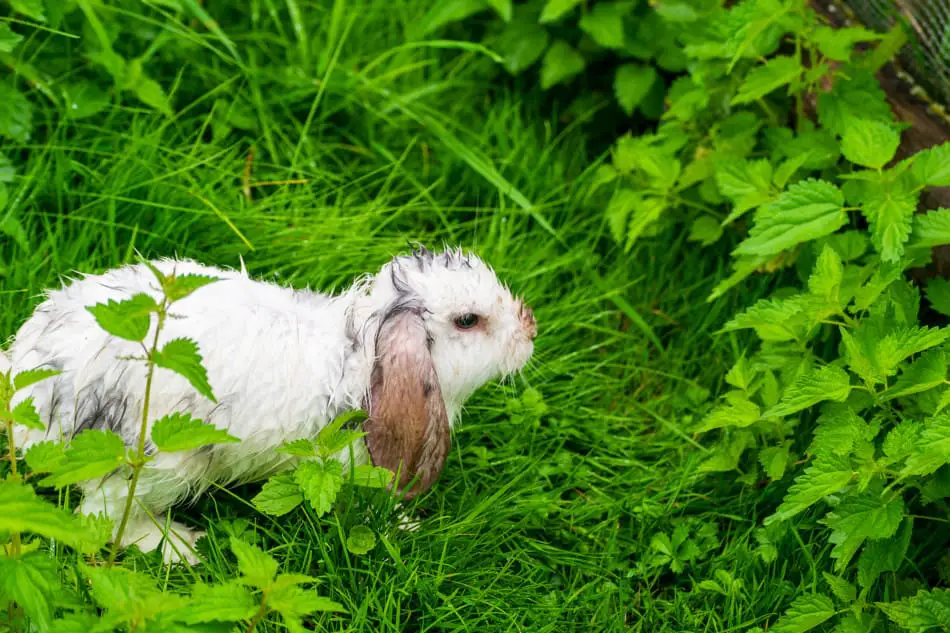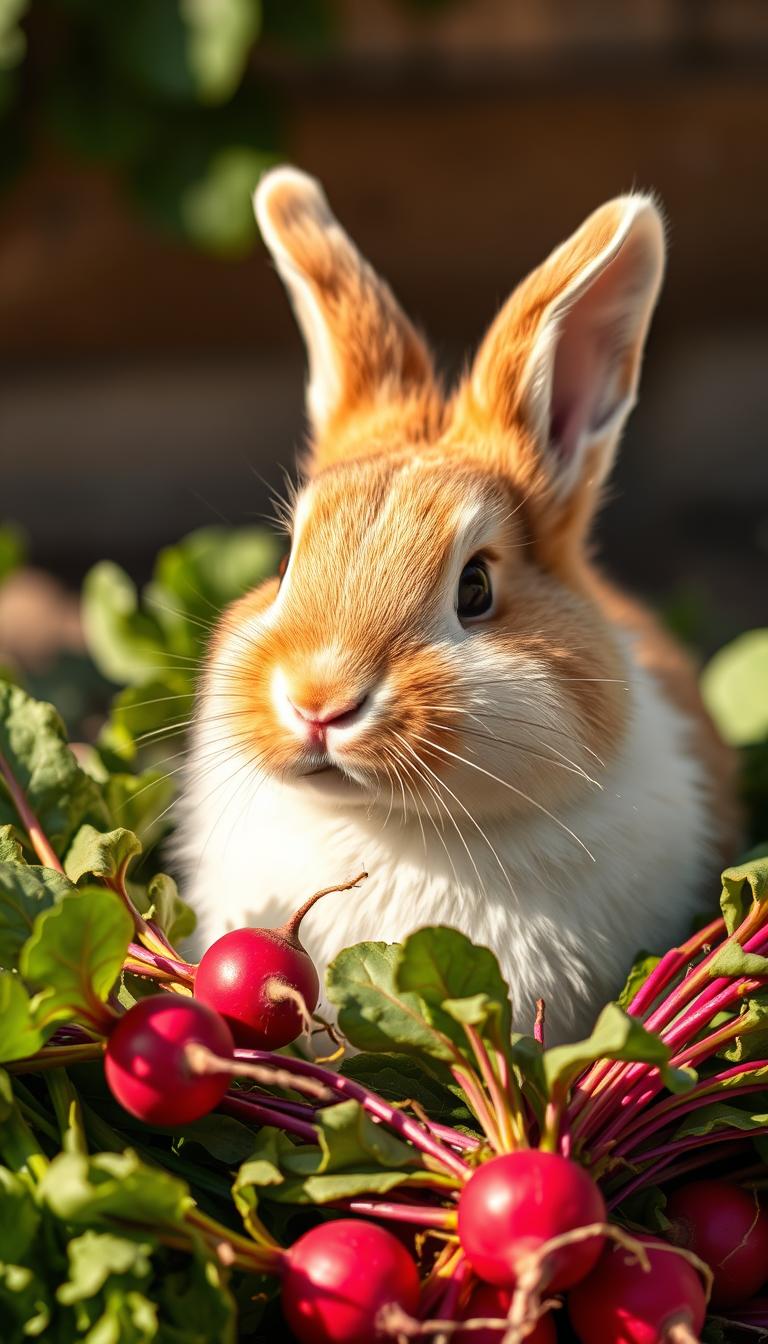When I first started to keep rabbits I was told never to get him wet –
Let’s have a look at the real reason why Rabbits should not get wet.
No, rabbits should not get wet, as a rule of the thumb. There are exceptions, however. In some cases, rabbits may soil themselves which may
At these times, a rabbit-safe bath becomes necessary.

When you get your rabbit wet, this should be on only a small part of their body. Soak no more than their rear and back feet, specifically.
You see, rabbits are not meant to get wet naturally. Their fur repels light water droplets, to protect their sensitive skin.
A dousing will cause a rabbit intense distress, and even cause them to go into shock.
To eliminate this risk, learn some safe ways you can bathe your bunny.
Table of Contents
Is It Dangerous For A Pet Rabbit To Get Wet?
Indeed, getting a pet rabbit wet can prove very dangerous. You must go about it in just the right way. Never, in any circumstance, should a rabbit be submerged in
They are perfectly good at keeping themselves tidy. Should you force a bath on them, they will react with kicks, bites, and other attempts to escape. This is because rabbits know that water will affect them harmfully.
So, always use due care when applying any degree of water to your bunny, and never wet their entire body.
Along with this, do not have your rabbit out in the rain. Make sure that they have shelter, and that they are staying reasonably dry. This is an especially good time to keep them inside.
Do Rabbits Get Sick If They Get Wet?
When a rabbit gets wet completely, they experience intense distress. They will struggle to avoid this at all costs.
There is even a risk that they will injure themselves from this alone, as they fight to get free. They are capable of breaking their own spines in a panic. When a rabbit becomes wet, they will then go into shock.
Even in warm weather, rabbits are also prone to hypothermia. They get cold quickly and dry slowly – a combination that is potentially deadly.
Finally, rabbit skin is very soft and delicate. When its skin gets wet, it becomes even softer. This makes it prone to tears that can become wounds that are hard to manage.
So, yes, a rabbit can

Can Rabbits Die If They Get Wet?
Sadly, yes; if rabbits get wet, they can die. This is due to either shock or hypothermia, typically. Avoid this tragic ending by keeping your bun nice and dry, or with a proper, rabbit-safe bath rather than the risky alternative.
What Should You Do If Your Rabbit Gets Wet?
Should your rabbit become wet, dry them immediately! There is a two-step process for doing this effectively.
Drying Your Rabbit Properly
First, gently but thoroughly towel-dry your bunny. Some opt to use soft handcloths or paper towels, as these are extra-gentle.
Once you’ve blotted your bun reasonably dry, finish the job with a blowdry. Turn on the blow-dryer prior to bringing it close to your bunny.
This will allow them to get more used to the noise. Keep the blowdryer on a low fan and low heat, or you risk burning the sensitive eyes, nose, ears, and skin of your bunny.
Secondly, o
This process is necessary not only if you bathe your bunny, but if they become at all wet accidentally. Do not let your rabbit suffer from being wet for any amount of time.
Keep them safe, and dry!
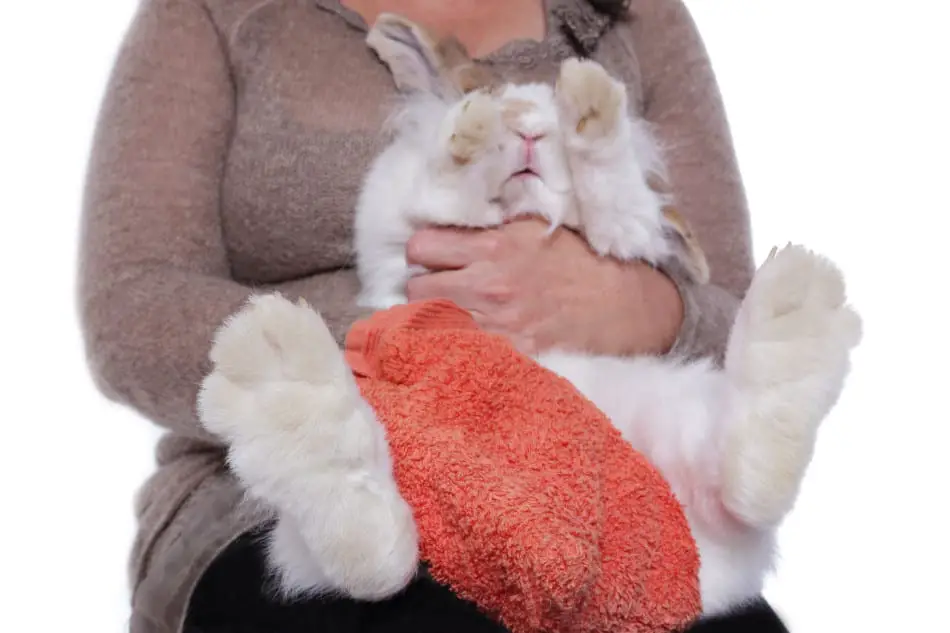
When Should You Administer A Rabbit-Safe Bath?
As touched on above, there are some instances in which you should bathe your bunny. A rabbit may be unable to reach certain spots due to obesity, illness, arthritis, or injury. Usually, the perineal area becomes the dirtiest.
This area entails the rear, as well as the sexual organs. Urine scalding and dropping-clumps often occur here.
For the wellbeing of your pet, you must give IT special, rabbit-safe baths only. There are a few of these you can pick from.
The best depends on what kind of mess there is on your bunny. Is it dry? Then IT will probably need a rinse or a soak.
Wet messes can be absorbed with a cornstarch-based baby powder that is talc-free and fragrance-free. Use your best judgment to pick the right bath for your bunny.
Rabbit Baths
Most rabbits prefer dry baths, since they are not fans of water, understandably. This method is the most advisable. However, dry baths work mainly on wet messes, as these work through absorbancy.
Dry soiling, on the other hand, will probably call for a rinse or soak. These are a bit more heavy-duty. Rinses work on moderate messes, as well as those that are severe. Soaks are best for the most stubborn grime.
Recommended is to opt for a dry bath for rabbits if possible, but a rinse or soak if truly necessary – which it sometimes really is.
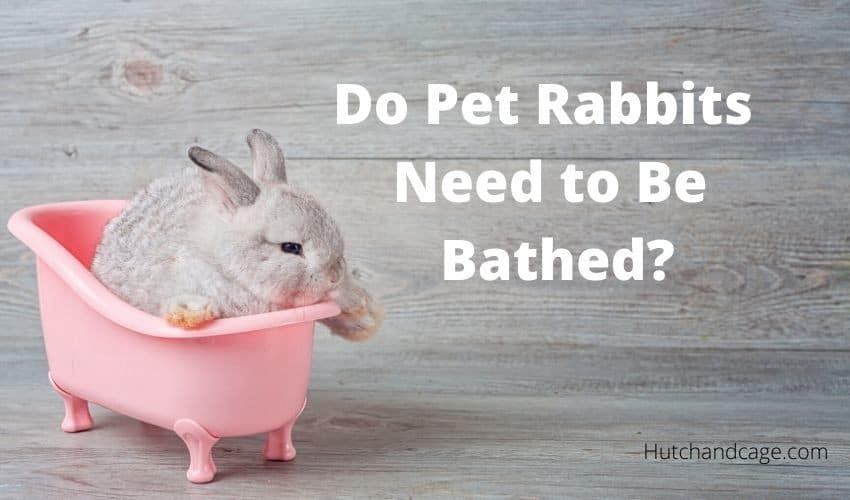
Rabbit-Safe Rinse Baths
To rinse your bun, you will need two people. You will also require a slip-free mat, a sink, and a certified rabbit-safe shampoo if you feel it is necessary.
Water alone can work fine, but some messes call for more.
- Set the slip-proof mat in the sink. Someone must hold your rabbit, and the other person must apply the faucet or spray nozzle. Once again, never wet more than the rear and back feet of your bunny.
- Additionally, never get their ears wet, specifically the insides. This can give them ear-infections that require veterinary attention. Wet just a small, specific portion of your rabbit and you will not have to worry.
- Massage the mess out of your rabbit’s fur, with or without shampoo. You can use a comb on clumps and other parts that are tricky.
- Once the bath is done, immediately dry your rabbit off completely. Leave them pristine and toasty-dry.
Rabbit-Safe Soak Baths
Should you feel that your rabbit needs a soak, head to your bathroom.
- Run the bathtub just enough to fill the tub about 2 inches high. Put the water on a lukewarm-warm (but not even close to hot!) temperature. Have your rabbit shampoo handy (just water can work fine, too).
- Place a slip-proof mat in the bathtub. You can now bring in your bunny. Be sure to keep them calm and soothed; do not attempt to use physical force on your bunny. This will only harm them, or cause them to harm themselves.
- Firmly place your rabbit rear-down in the water. Allow them to soak a moment, and then start moving the water through their soiled fur with your hands. You can incorporate rabbit-safe shampoo at this time. Never use shampoos that are not for rabbits specifically. Cat and dog shampoos are too harsh. Try finding rabbit shampoo online if you are unable to locate it at the store. Shampoos for small critters also generally work okay.
- Massage the shampoo into your rabbit’s fur gently. Throughout the process, you may wish to talk to them reassuringly. They are unlikely to be thrilled by the idea of a bath, but they will get used to the idea over time.
Just make sure not to use a wet bath on your rabbit any more often than is strictly needed. As mentioned, rabbits are naturally fastidiously clean creatures.
Rabbit-Safe Dry Baths
Dry baths are the most well-liked baths among bunnies. This is because there is no water involved, doubtlessly.
When it comes to hating and fearing water, rabbits could give cats a run for their money. In fact, they win out, probably, because they are even more sensitive.
This in mind, it is no wonder rabbits prefer dry baths. So, if at all possible, opt for a dry bath initially. Should this bath fail to work – if the mess is too dry itself – your rabbit may then be due for a rinse or a soak.
To undertake a dry bath, you will need a few basic supplies.
- First off, get your handy slip-proof mat. Place this on the floor, table or surface that you intend to use. Next, obtain a
cornstarch-based baby powder. This must be talc-free and fragrance-free. - Lay your bun on their back, belly-up, and apply the baby powder to the soiled areas liberally.
- Massage the powder in, and soiled bits should begin to come loose.
- This is when you will need a hand-held vacuum. This will be used to suck up the baby powder that has become dirty and fallen away.
- Allow your bunny to become used to the sound of the vacuum before you bring it close. You can do this by letting it run nearby for awhile.
- Sometimes there are clumps in the fur that are hard to remove. Avoid pulling on these, and do not try to cut them away. This will just hurt your rabbit’s skin. Instead, use a wide-toothed rabbit comb to untangle the clumps and brush them free with care.
- Once you are done with the dry bath, brush all of the excess powder from your bunny.
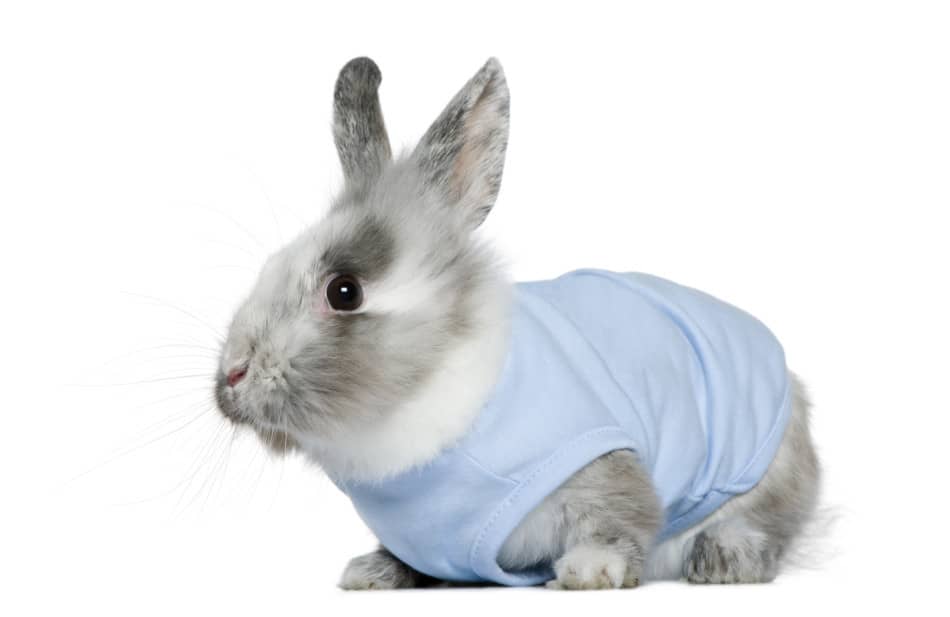
Dry And Reward Your Bunny
Your rabbit has been through quite the ordeal! Make sure to swiftly get them dry. Dry them with towels, and then blow-dry them fluffy. Make sure that, at the end of everything, they are cozy and warm.
Praise your rabbit for their patience, and give them treats. This will also reinforce the experience in their minds more positively.
The bath was no fun – but they did good, and there were treats at the end, anyway.
Opt for crunchy veggies or fruits like berries. These are healthier than those you can find at the store. You want to leave your rabbit feeling clean, cared-for and content, ultimately.
Conclusion: Can Bunny Rabbits Get Wet?
So, as you can see, rabbits can get wet… but only sometimes. Most of the time this should be avoided at all costs. Rabbits take pride in keeping their space, and themselves, tidy. So there is no need for them to bathe.
In some cases, though, they are simply not capable of cleaning themselves properly. Take care of urine scalding as soon as it appears. Do not allow droppings to linger. Clearly, these things are terrible for hygiene.
When it comes to getting your rabbit wet, it is all about balance. Step in only when necessary. Soon, your rabbit is sure to notice how clean they are. This will greatly improve their life quality. A clean bunny is a happy bunny!

